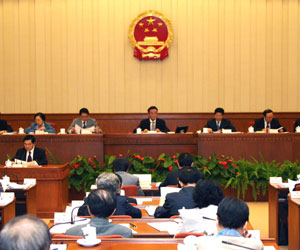China's top legislature,
the standing committee of National People's Congress, has on Saturday
has opened a six-day session to consider a long-awaited anti-monopoly law.
The standing committee of the National People's Congress was to deliberate on
the anti-monopoly draft for the first time, Xinhua news agency reported
Saturday.

Wu Bangguo (C), chairman of the
National People's Congress (NPC) Standing Committee, China's top
legislator, presides over the 22nd session of the 10th NPC Standing
Committee, or China's legislature, in Beijing, capital of China, on June
24, 2006. [Xinhua] |
"The aim of the law is to protect fair competition, prevent and check
monopolistic behavior and maintain an orderly market place," Xinhua said of the
draft law.
The draft law banned monopolistic agreements, such as price-fixing and other
forms of collusion, while providing guidelines on investigating and prosecuting
monopolistic practices, it said.
"With mergers and reshuffles frequently taking place by domestic and overseas
enterprises, monopolies have emerged in certain areas and certain sectors,"
Xinhua quoted Cao Kangtai, a legal affairs official with the State Council,
China's cabinet, as saying.
"It is very necessary to formulate the anti-monopoly law."
According to Xinhua, the draft law calls for a special anti-monopoly
commission to be set up to deal with anti-monopoly cases.
Earlier press reports said the law aimed to prevent multinational
corporations from gaining monopoly status in China through foreign investment
and mergers and acquisitions.
But the measure is fraught with difficulties, including how to handle state
monopolies in areas such as energy, land rights, insurance, telecommunications
and tobacco.
The draft was approved by the State Council, China's cabinet, earlier this
month but versions of the draft have not been made public. It was first drafted
in 1994 after preparatory work began as early as 1987.
Also during the session, a bill on how the government responds to emergencies
such as industrial accidents, natural disasters or health and social crises was
to be heard, the parliament said.
The legislature would also hear a report on how a law on regional autonomy
for minority nationalities was being implemented in 20 provinces and regions, it
said.